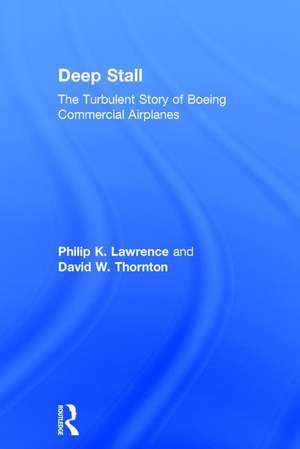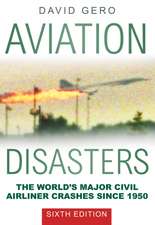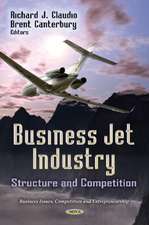Deep Stall: The Turbulent Story of Boeing Commercial Airplanes
Autor Philip K. Lawrence, David W. Thorntonen Limba Engleză Paperback – 27 feb 2017
| Toate formatele și edițiile | Preț | Express |
|---|---|---|
| Paperback (1) | 469.34 lei 6-8 săpt. | |
| Taylor & Francis – 27 feb 2017 | 469.34 lei 6-8 săpt. | |
| Hardback (1) | 998.71 lei 6-8 săpt. | |
| Taylor & Francis – 6 oct 2005 | 998.71 lei 6-8 săpt. |
Preț: 469.34 lei
Nou
Puncte Express: 704
Preț estimativ în valută:
89.81€ • 97.86$ • 75.68£
89.81€ • 97.86$ • 75.68£
Carte tipărită la comandă
Livrare economică 23 aprilie-07 mai
Preluare comenzi: 021 569.72.76
Specificații
ISBN-13: 9781138273559
ISBN-10: 1138273554
Pagini: 172
Dimensiuni: 156 x 234 x 9 mm
Greutate: 0.45 kg
Ediția:1
Editura: Taylor & Francis
Colecția Routledge
Locul publicării:Oxford, United Kingdom
ISBN-10: 1138273554
Pagini: 172
Dimensiuni: 156 x 234 x 9 mm
Greutate: 0.45 kg
Ediția:1
Editura: Taylor & Francis
Colecția Routledge
Locul publicării:Oxford, United Kingdom
Cuprins
Contents: Introduction; Pre-history: the era before civil jet transport; Boeing and the Cold War: from the jet bomber to the civil transport; Extending the product range: from financial disaster to market dominance; European Renaissance: the rise of Airbus; Boeing's response to the A300: a tale of two models; Boeing: the flight from innovation; Interlude: the Airbus vs. Boeing trans-Atlantic trade and subsidy battle; The crisis deepens; Postscript: a Boeing comeback?; Bibliography; Index.
Notă biografică
Philip K. Lawrence is Director of the Aerospace Research Centre at the University of the West of England, Bristol, UK. He holds degrees in Politics, Sociology, Economics and Engineering and is the author of 7 previous books; including, Aerospace Strategic Trade, (Ashgate, 2001), Modernity and War, (Macmillan, 1999) Strategic Trade in Commercial-Class Aircraft, (RIIA, 1998) and Preparing for Armageddon (Wheatsheaf, 1988). David W. Thornton is Associate Professor in Government and History at Campbell University, North Carolina, USA. He gained his Ph.D in Political Economy from the University of North Carolina and is the author of the seminal study, Airbus Industrie: The Politics of an International Industrial Collaboration (Macmillan, 1995).
Recenzii
’This is an important book as much for its penetrating analysis of a highly significant commercial case study as for the significance that it attaches to studying such phenomena from the perspective of political economy. Deep Stall deserves to be widely read.’ Professor Michael Scriven, Director, The European Business School, Regents College, London, UK 'A beguiling cocktail of aviation history, political economy, business studies and social science, Deep Stall is really the story of the rise and fall of Boeing, a fall compassed by its European rival Airbus. Covering an amazing stretch of ground, it provides thumb-nail sketches of the history of flight, US foreign policy since 1945, and the economic theory of comparative advantage. Clear and absorbing, with avoidance of jargon and unnecessary acronyms, this is a book that can be read with profit and pleasure by a wide range of people, from the plane spotter at one end of the spectrum to the sophisticated MBA student at the other. It is a triumph of lucid compression.' Frank McLynn, Author and Visiting Professor, Strathclyde University, UK ’The new book, by Philip Lawrence of the University of the West of England and David Thornton of Campbell University in the US, is a fascinating account of Boeing's turbulent history. Using a strategic analysis model, Deep Stall offers a powerful critique of the company's neglect of ’strategic value in favour of shareholder value', favouring short-term profits over investment in new aircraft. Charting Boeing's continued exportation of aircraft program work to Asian subsidiaries, the book also provides valuable material for debates on globalisation and on the future of US manufacturing.’ HERO, Higher Education and Research Opportunities in the UK ' Deep Stall is recommended reading for everyone interested in the commercial aircraft market and in Boeing in particular' - Aerlines Magazine, e-zine edition, Issue 34. 'The book is a pleasant read in its fascinating current
Descriere
Boeing is one of the jewels in the US technology crown, but today US jobs are being exported abroad, with most of its aircraft program work based in Asia. Using Airbus as a comparison, Deep Stall utilizes the concept of strategic analysis to explain Boeing’s decline and what can happen when a company places shareholder value over strategic value.








